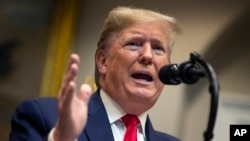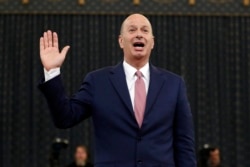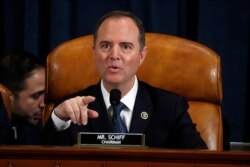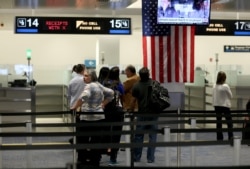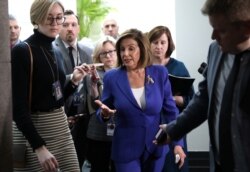In his first formal response to impeachment charges, President Donald Trump misrepresented the testimony of a key witness who described an exchange of favors in the Ukraine matter.
The claim marked a week of frequent exaggeration and distortion by the president heading into the opening statements of his impeachment trial.
Just as his tax cuts are far from the biggest in history, the economy isn't the best ever and his election victory in 2016 was no landslide of historic proportions, Trump's two trade deals don't stand atop the field of presidential endeavors. One is a partial settlement of trade grievances with China; the other is a refresh of what past presidents created for North America.
Meanwhile, the Democratic presidential contenders weren't immune from misrepresentation in their final debate before the first votes of the 2020 campaign, in Iowa.
A look at the claims:
Impeachment
Trump, via attorneys: “Individuals who have stated for the record that they spoke to the President about the subject actually exonerate him. Ambassador to the European Union Gordon Sondland stated that when he asked the President what he wanted from Ukraine, the President said: `I want nothing. I want no quid pro quo.”' — response to impeachment charges filed Saturday.
The Facts: That assertion omits key context on what Sondland told House investigators.
As one of the officials most deeply involved in trying to get Ukraine to do Trump's bidding, Sondland testified that there was indeed a quid pro quo in the matter and “everyone was in the loop.” Specifically, Sondland said it was understood that Ukraine's new president would only get a meeting with Trump in the Oval Office if he publicly pledged to investigate the Bidens and the Democrats.
“Was there a `quid pro quo?' Sondland asked in his statement to the House Intelligence Committee. “As I testified previously, with regard to the requested White House call and White House meeting, the answer is yes.”
Moreover, on the more serious matter of withholding military aid to Ukraine unless the country investigated Democrats, Sondland testified that a this-for-that explanation was the only one that made sense to him.
Testimony from other officials shored up the picture of a president and his associates systematically trying to get Ukraine to do what Trump wanted during a period when the military assistance approved by Congress was put on hold without explanation.
Trump: “The President acted at all times with full constitutional and legal authority and in our national interest.” — response to impeachment charges.
The Facts: That, of course, is in dispute. The nonpartisan Government Accountability Office, the investigative arm of Congress, found the White House violated federal law in withholding security assistance to Ukraine, an action at the center of Trump's impeachment.
Its report said the Office of Management and Budget broke the law over the military aid, which Congress passed less than a year ago, saying “the President is not vested with the power to ignore or amend any such duly enacted law.”
The money was held up last summer on orders from Trump but freed up in September after Congress pushed for its release and a whistleblower's complaint about Trump's July call with the Ukrainian leader became public.
The Government Accountability Office said the White House budget office violated the Impoundment Control Act by delaying the security assistance for “policy reasons,” rather than technical budgetary needs.
The budget office has said it disagrees with that finding and the hold was appropriate and necessary. Trump argues he delayed the $391 million in U.S. assistance because of concerns about corruption, although the Defense Department had already previously certified to congressional committees that Ukraine had made enough progress on reducing corruption to receive the aid.
Trump: “House Democrats ran a fundamentally flawed and illegitimate process that denied the President every basic right, including the right to have counsel present, the right to cross-examine witnesses.” — response to impeachment charges.
Trump: “'We demand fairness' shouts Pelosi and the Do Nothing Democrats, yet the Dems in the House wouldn't let us have 1 witness, no lawyers or even ask questions.” — tweet on Jan. 13, referring to House Speaker Nancy Pelosi.
The Facts: Not true. The House Judiciary Committee, which produced the articles of impeachment, invited Trump or his legal team to come. He declined.
Absent White House representation, the hearings proceeded as things in Congress routinely do: Time is split between Democratic and Republican lawmakers to ask questions and engage in the debate. Lawyers for Democrats and Republicans on the committee presented the case for and against the impeachment articles and members questioned witnesses, among them an academic called forward by Republicans.
The first round of hearings was by the House Intelligence Committee and resembled the investigative phase of criminal cases, conducted without the participation of the subject of the investigation. Trump cried foul then at the lack of representation, then rejected representation when the next committee offered it.
His lawyers will participate in the Senate's impeachment trial, which resumes Tuesday.
Trump, on House intelligence chairman Adam Schiff: “Mr. Schiff created a fraudulent version of the July 25 call and read it to the American people at a congressional hearing, without disclosing that he was simply making it all up.” — response to impeachment charges.
The Facts: It's incorrect that Schiff didn't disclose what he was doing.
Trump is overstating Schiff's exaggerations, which the president has repeatedly described as lies and “massive frauds.” The California Democrat, in what he said was a parody during a committee hearing in September, was mocking the president's pleas in his July call to Ukrainian President Volodymyr Zelenskiy, as Trump does with his critics routinely.
Schiff made clear he was providing an account that was in “essence” what he believed Trump was conveying to Zelenskiy, when “shorn of its rambling character.
Trump: “You had a fake whistleblower that wrote a report that bore no relationship to what was said. Everything was false.” — remarks Thursday.
The Facts: Trump's statement is false. The whistleblower's account of a phone call between Trump and Ukraine's leader in July closely resembled what was said, judging by the rough transcript released later by the White House itself and by the testimony of officials who listened in on the call.
Witnesses in the impeachment hearings and other sources also verified the whistleblower's description of events before and after the call as Trump and his aides pressed Ukraine to investigate one of Trump's political rivals, Democrat Joe Biden. The Senate impeachment trial will explore whether Trump abused his power.
Trade
Trump on his trade agreement with China: “This is the biggest deal there is, anywhere in the world by far.” — remarks Wednesday at the signing.
Trump on the China deal and his updated North American trade agreement: “So we've done two of the biggest trade deals. They are the two biggest trade deals in the world ever done.” — remarks at the White House on Thursday.
The Facts: Neither claim is true.
The China agreement is not nearly as big as the U.S.-Mexico-Canada agreement, so it's not the largest ever, much less “by far.” The deal with Canada and Mexico was an update of the long-standing North American Free Trade Agreement worked out by Presidents George H.W. Bush and Bill Clinton.
The North American agreement also is not the largest ever.
For instance, 123 countries signed the Uruguay Round agreement that liberalized trade and produced the World Trade Organization in 1994. The organization's initial membership accounted for more than 90% of global economic output, the Federal Reserve Bank of Boston found, and that was before China joined the organization.
Also bigger: the Trans-Pacific Partnership, which would have joined North America with Pacific Rim countries in freer trade. Trump took the U.S. out after the deal was negotiated and before the U.S. ratified it. The European Union was formed from a giant deal.
The China deal leaves tariffs in place on about $360 billion in imports from China and pushes substantial remaining disputes ahead to a second phase of negotiations.
Trump on China deal: “I did the biggest deal ever done in the history of our country yesterday in terms of trade — and probably other things too, if you think about it.” — remarks Thursday.
The Facts: Trump is even more wildly off the mark in speculating that his China trade deal eclipses all other international agreements, even outside trade.
The Montreal Protocol, aimed at protecting Earth's ozone layer, was ratified by every member state of the United Nations. A variety of other agreements — on the rights of children, world health standards, droughts — achieved nearly universal ratification. More than 190 countries signed the Paris accord on climate change, of which more than 180 have ratified it. The U.S. is pulling out of it.
Economy
Trump: “In Wisconsin, the unemployment rate has reached its lowest level in history.” — Milwaukee rally Tuesday.
The Facts: He's citing outdated figures.
Wisconsin did post a record low unemployment rate of 2.8% in April and May. But it has since edged up and is now at 3.3%. That's slightly lower than the U.S. average of 3.5%, but suggests that the state hit a rough patch in the middle of last year.
Trump: “More than 300,000 people under Obama, 300,000 people, left the workforce. Under just three years of my administration, 3.5 million people have joined the workforce.” — Milwaukee rally.
The Facts: Trump is wrong about Barack Obama's record.
More than 5 million people joined the U.S. labor force during Obama's presidency, according to Labor Department figures. These gains reflect the recovery from the Great Recession as well as population growth. More than 4.8 million people have joined the labor force in three years of Trump's presidency.
Trump: “Under the Trump economy, the lowest-paid earners are reaping the biggest, fastest and largest gains. ... Earnings for the bottom 10% are rising faster than earnings for the top 10%, proportionally.” — Milwaukee rally.
The Facts: Actually, the top 10% of earners saw the biggest raises of any income bracket over the past year. Their usual weekly earnings jumped 8% or $168, according to the Labor Department. The bottom 10% saw weekly incomes grow 7% or $30.
Over a broader range — the top and bottom 25% — weekly earnings also grew at faster rate for the wealthier group.
Trump: “We've created 7 million jobs since the election including more than 1 million manufacturing and construction jobs. Nobody thought that was possible.” — Milwaukee rally.
The Facts: His numbers are roughly right, though they are less impressive than Trump claims.
Job gains under Trump over the past three years were lower than during the final three years of Obama's presidency. More than 8 million jobs were added during that period under Obama, including 1.2 million combined in manufacturing and construction. What these figures suggest is that much of the job growth under Trump reflects the momentum from a recovery that officially began in the middle of 2009.
Immigration
Trump: “We have loopholes. Like a visa lottery. We put things in the lottery, and they come in — they become American citizens. Do you think these countries are giving us their finest? Oh, let's give them our best citizens.” — Milwaukee rally.
The Facts: This is a perpetual falsehood from the president. Countries don't nominate their citizens for the program. They don't get to select people they'd like to get rid of.
Foreigners apply for the visas on their own. Under the program, citizens of countries named by the U.S. can bid for visas if they have enough education or work experience in desired fields. Out of that pool of qualified applicants, the State Department randomly selects a much smaller pool of tentative winners. Not all winners will have visas approved because they still must compete for a smaller number of slots by getting their applications in quickly.
Those who are ultimately offered visas still need to go through background checks, like other immigrants.
Trump: “Mexico's paying for the wall. ... You know that. It's all worked out.” — Milwaukee rally.
The Facts: Mexico isn't paying for Trump's long-promised border wall.
Trump has argued that the updated trade agreement with Canada and Mexico will pay for the wall because of economic benefits he predicts will come from the deal. Nothing in the trade agreement would cover or refund the construction cost or require a payment from Mexico.
Child care
Biden, on his early days in Washington: “I was making $42,000 a year. I commuted every single solitary day to Wilmington, Delaware — over 500 miles a day, excuse me, 250 miles a day — because I could not afford ... child care. It was beyond my reach.” — Democratic presidential debate Tuesday.
The Facts: That's a stretch.
Biden's wife and daughter died in a car accident after he won a Senate seat in 1972 As a single parent working far out of town, Biden might have faced steeper child care costs than people who work locally do. But his Senate salary — actually $42,500 — was worth more than $256,000 in today's dollars. That's more than four times the median household income.
Health care
Trump: “I was the person who saved Pre-Existing Conditions in your Healthcare, you have it now.” — tweet on Jan. 13.
The Facts: That's false. People with preexisting medical problems have health insurance protections because of Obama's health care law, which Trump is trying to dismantle.
One of Trump's major alternatives to Obama's law — short-term health insurance, already in place — doesn't have to cover preexisting conditions. Another alternative is association health plans, which are oriented to small businesses and sole proprietors and do cover preexisting conditions.
Meanwhile, Trump's administration has been pressing in court for full repeal of the Obama-era law, including provisions that protect people with preexisting conditions from health insurance discrimination.
With “Obamacare” still in place, insurers in the individual marketplace must take all applicants, regardless of medical history, and charge the same standard premiums to healthy people and those who have poor health or past medical problems. Before Obama's law, any insurer could deny coverage or charge more to anyone with a preexisting condition who was seeking to buy an individual policy.
Bernie Sanders: “'Medicare for All' ... will cost substantially less than the status quo.” — Democratic debate.
The Facts: There's no guarantee of that.
The nonpartisan Congressional Budget Office said in a report last year that total spending under a single-payer system like the Vermont senator and Democratic presidential candidate favors “might be higher or lower than under the current system depending on the key features of the new system.”
Those features have to do with the design of the system, questions such as payment rates for hospitals and doctors, and whether patients are required to pay part of the cost of their care. Sanders says his plan would require no cost-sharing from patients, no copays and no deductibles. But completely free care could trigger a surge in demand for medical services, raising costs. Other countries that provide coverage for all do use cost-sharing to help keep spending in check.
A research report last year by the nonprofit Rand think tank estimated that a Medicare for All plan similar to what Sanders wants would modestly raise total U.S. health spending.
Military
Trump, on killing Iran Gen. Qassem Soleimani: “The Democrats and the Fake News are trying to make terrorist Soleimani into a wonderful guy.” — tweet on Jan. 13.
Trump: “You know what bothers me? When I see a Nancy Pelosi trying to defend this monster from Iran ... When Nancy Pelosi and the Democrats want to defend him, I think that's a very bad thing for this country.” — remarks on Jan. 9 at event on environmental regulations.
The Facts: That's a fabrication. Democrats did not praise or defend the Iranian general. They criticized the action Trump took.
Pelosi called the U.S. missile strike “provocative and disproportionate” while branding Soleimani a “terrible person.” Similarly, Democratic presidential candidates criticized Trump's strategy and the fact he didn't notify or consult Congress in advance, while making clear they considered Soleimani anything but “wonderful.”
The Iranian was “a murderer, responsible for the deaths of thousands, including hundreds of Americans,” said Massachusetts Sen. Elizabeth Warren.
Even so, Republican Rep. Doug Collins of Georgia asserted Democrats were “in love with terrorists” then retracted the statement and apologized.
“I left parts of my body in Iraq fighting terrorists,” Democratic Sen. Tammy Duckworth of Illinois, a former Army pilot who lost both her legs while serving in Iraq, told CNN after hearing Collins' initial remarks. “I don't need to justify myself to anyone.”
Trump: “Our military has been totally rebuilt.” — Milwaukee rally.
The Facts: It hasn't.
The administration has accelerated a sharp buildup in defense spending, but it will take years for freshly ordered tanks, planes and other weapons to be built, delivered and put to use.
The Air Force's Minuteman 3 missiles, for instance, a key part of the U.S. nuclear force, have been operating since the early 1970s, and modernization started under the Obama administration. They are due to be replaced with a new version, but not until later this decade.
Biden: “I was asked to bring 156,000 troops home from that war, which I did. I led that effort.” — Democratic debate.
The Facts: Biden is roughly right about bringing troops home, but he didn't mention that the U.S. had to send some back.
Obama did designate Biden, his vice president, to take the lead in pulling U.S. forces out of Iraq and coordinating efforts to maintain stability in Baghdad. His results were mixed. Biden and Obama failed to win agreement from the Iraqi government to keep a limited number of U.S. troops there after December 2011. That was the deadline for a complete U.S. pullout under a deal negotiated by the Bush administration. Biden was still vice president when Obama was compelled to return American troops to Iraq in 2014 after the rise of the Islamic State group.
Electability
Trump, on the 2016 election: “There have been some great movements where somebody came along and out of the nowhere, won the state of New Hampshire, won Iowa, won South Carolina down the way, won a state someplace, but we won 32 states.”
The Facts: Trump won 30 states, not 32.
It was no landslide. He won with about 57% of electoral votes, a comfortable margin but no better than average or below average. Obama and Clinton each won bigger victories twice and many other presidents outperformed Trump.
Moreover, Republican Trump lost the popular vote to Democrat Hillary Clinton, a rare occurrence for a winning candidate.
Trump routinely inflates the number of electoral votes he won, too.




